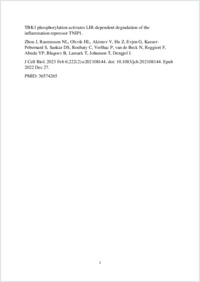TBK1 phosphorylation activates LIR-dependent degradation of the inflammation repressor TNIP1
DOKPE
- Zhou, Jianwen ORCID University of Fribourg
- Rasmussen, Nikoline Lander ORCID University of Tromsø
- Olsvik, Hallvard Lauritz ORCID University of Tromsø
- Akimov, Vyacheslav University of Southern Denmark
- Hu, Zehan University of Fribourg
- Evjen, Gry ORCID University of Tromsø
- Kaeser-Pebernard, Stéphanie ORCID University of Fribourg
- Sankar, Devanarayanan Siva University of Fribourg
- Roubaty, Carole University of Fribourg
- Verlhac, Pauline ORCID University of Groningen
- van de Beck, Nicole University of Groningen
- Reggiori, Fulvio ORCID University of Groningen
- Abudu, Yakubu Princely ORCID University of Tromsø
- Blagoev, Blagoy ORCID University of Southern Denmark
- Lamark, Trond ORCID University of Tromsø
- Johansen, Terje ORCID University of Tromsø
- Dengjel, Jörn ORCID University of Fribourg
- 27.12.2022
Published in:
- Journal of Cell Biology. - Rockefeller University Press. - 2022, vol. 222, no. 2
English
Limitation of excessive inflammation due to selective degradation of pro-inflammatory proteins is one of the cytoprotective functions attributed to autophagy. In the current study, we highlight that selective autophagy also plays a vital role in promoting the establishment of a robust inflammatory response. Under inflammatory conditions, here TLR3-activation by poly(I:C) treatment, the inflammation repressor TNIP1 (TNFAIP3 interacting protein 1) is phosphorylated by TBK1 (Tank-binding kinase 1) activating a LIR motif that leads to the selective autophagy-dependent degradation of TNIP1, supporting expression of pro-inflammatory genes and proteins. This selective autophagy efficiently reduces TNIP1 protein levels early (0-4 h) upon poly(I:C) treatment to allow efficient initiation of the inflammatory response. At 6 h TNIP1 levels are restored due to increased transcription avoiding sustained inflammation. Thus, similarly as in cancer, autophagy may play a dual role in controlling inflammation depending on the exact state and timing of the inflammatory response.
- Faculty
- Faculté des sciences et de médecine
- Department
- Département de Biologie
- Language
-
- English
- Classification
- Biology, life sciences
- License
- Open access status
- green
- Identifiers
-
- DOI 10.1083/jcb.202108144
- ISSN 0021-9525
- Persistent URL
- https://folia.unifr.ch/unifr/documents/323024
Other files
Statistics
Document views: 74
File downloads:
- zhou_2022_finalmanuscript: 106
- zhou_2022_finalsupplements: 93

